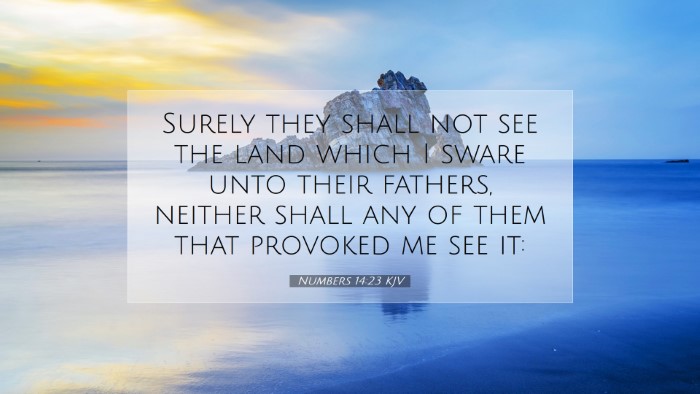Commentary on Numbers 14:23
Verse Text: "Surely they shall not see the land which I swore to their fathers, nor shall any of those who rejected Me see it."
Introduction
The episode documented in Numbers 14 presents a profound moment of divine judgment against the Israelites following their rebellion against God. The text reflects on themes of faith, disobedience, and the consequences of a hardened heart, thus forming an essential cornerstone in the theological understanding of God's covenant relationship with His people.
Contextual Background
This verse finds its place in a narrative where the children of Israel, after witnessing God's miracles and providences, display a lack of faith when faced with the daunting task of entering the Promised Land. Their refusal to trust God results in a severe divine proclamation encapsulated in this verse.
- Historical Context: This event occurs shortly after the Exodus, a pivotal moment in the history of Israel as they journey towards the Promised Land.
- Theological Context: Numbers 14 serves as a critical commentary on Israel's relationship with God, illustrating the serious ramifications of disbelief and rebellion.
Verse Analysis
The emphasis of God's declaration in Numbers 14:23 rests on the certainty of judgment articulated through the words "Surely they shall not see." This strong assertion serves multiple theological insights as follows:
- Divine Sovereignty: The phrase underscores the absolute authority of God in the affairs of men, particularly in the context of His covenant commitments.
- Consequences of Rebellion: Those who rejected God's promise encountered the dire consequences of their disbelief, a reminder of the seriousness of spiritual negligence.
- The Importance of Faith: The contrast between seeing the land and being barred from it underlines the necessity of faith in experiencing God's promises.
Insights from Public Domain Commentaries
Matthew Henry's Commentary
Henry elaborates on the gravity of Israel's rebellion, emphasizing that the consequences they faced were rooted in their failure to trust in God despite the evidence of His power and care. He points out that their refusal to enter the Promised Land was not just a physical rejection but a spiritual one that provoked God’s anger. It highlights a vital lesson about the significance of faithfulness in the believer’s journey.
Albert Barnes' Notes on the Bible
Barnes stresses the importance of the promise God made to the patriarchs, which was contingent upon the obedience and faith of their descendants. He explains that this generation's disbelief not only denied them the land but also had ramifications for future generations. Barnes draws attention to the mercy of God intermingled with His justice, noting that the next generation, raised in faith, would enter the Promised Land.
Adam Clarke's Commentary
Clarke provides a deeper exploration into the nature of God's judgment. He argues that the harshness of the decree – that none of those over a certain age would see the land – showcases God’s righteous response to sin. Clarke also emphasizes the extension of God's promise to future generations, indicating that divine purposes would not be thwarted by human disobedience. He further highlights God's mercy in allowing Caleb and Joshua, who remained faithful, to inherit the land as a testament to divine grace amidst judgment.
Theological Implications
The narrative encapsulated in Numbers 14:23 serves as a sobering reminder of the effects of collective disobedience. For pastors and theologians, this passage reinforces several critical theological concepts.
- Judgment and Grace: The dual themes of judgment against sin and the extending of grace to those who believe are profoundly illustrated here.
- Covenantal Faithfulness: This verse prompts reflection on covenant faithfulness, revealing that God's promises can be forfeited through incredulity.
- Leadership Responsibility: The role of leaders in guiding their people towards faith is an implicit lesson derived from this narrative, echoing the necessity of steadfastness in spiritual guidance.
Application for Contemporary Believers
In concluding, Numbers 14:23 holds valuable lessons for modern-day believers as we navigate our own journeys of faith. The passage stands as a clarion call to:
- Embrace Faith: Trusting God amidst challenges is essential for experiencing His promises.
- Acknowledge Consequences: Understanding that our choices have spiritual repercussions reinforces the need for discernment in our walk with God.
- Encourage One Another: As a community of faith, believers should support each other in maintaining steadfastness in belief and action.
Thus, as they reflect on this verse, pastors and scholars alike are encouraged to delve deeper into inquiry and teaching, promoting a culture of faith that seeks to glorify God in all circumstances.


